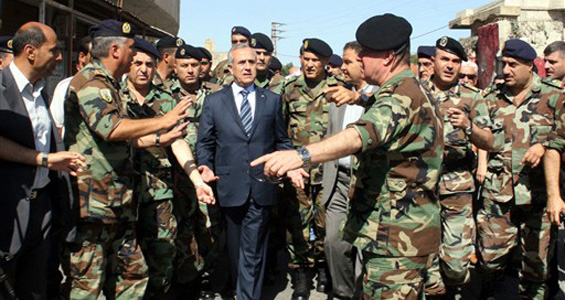Lebanon’s ‘hot summer’
The scars of the 2006 war have not yet healed, but many fear the drums of another are beating.

 |
| Michel Sleiman, centre, the Lebanese president, asked the Lebanese army to “confront any Israeli aggression, whatever the sacrifices” [AFP] |
“So do I need to worry about this incident in the south?” My friend, Nicole Saad, asked via text message from the US a few hours after the Lebanese and Israeli armies clashed near the border between the two countries on Tuesday. The clashes left two Lebanese soldiers, one Lebanese journalist and one Israeli soldier dead.
Nicole is looking forward to her decade-long overdue visit to her native country on August 6, and like many prospective visitors is now highly concerned about the security situation in Lebanon – particularly as countries like Canada, the US and the UK have issued travel warnings.
The border skirmishes might seem like a local and limited incident but their ramifications could significantly impact not just the security situation along the border but also the Lebanese economy.
Fragile economy
The Lebanese economy is based on tourism. Lebanon has no natural resources, no heavy industry, very limited exports and localised agriculture. But what the country does have are beautiful beaches and mountains.
It is a natural destination for residents of neighbouring Arab countries who escape their humid and hot summers to enjoy the milder Lebanese weather, generous hospitality and the array of entertainment events that the public and private sectors spend the whole year planning.
The Lebanese ministry of tourism was expecting millions of tourists and Lebanese expats to visit the country this year. Flights, hotels and car rentals were said to have been fully booked for July and August.
For two consecutive years, Beirut has been featured in The New York Times as a prime tourist destination. In 2009, Beirut was ranked as the most recommended place to visit and in May 2010 an article called ‘A Weekend in Beirut’ featured the city as one of the most happening places in the world.
Such reviews have contributed to swelling the ranks of Arab tourists and Lebanese expats with Europeans and Americans.
David Khoury owns two hotels in the famous Al Hamra district of central Beirut. He says both of his hotels have been fully booked so far, but he is worried that people will start canceling their reservations.
The ripple effect of such cancellations will also hit the restaurants, taxis, car rentals, event planners, farmers, importers – in fact, virtually everyone will be affected as the country relies heavily on the influx of tourists, particularly during August.
Heat of war
 |
| Hezbollah leader Hassan Nasrallah delivered a televised address to supporters [EPA] |
Talk of a ‘hot summer’ has increased among the Lebanese since the beginning of the year. But in Lebanon’s case, a ‘hot summer’ does not refer to the weather. Nor does it refer to the many festivals, concerts, beach parties and hundreds of other ‘hot events’ taking place.
By ‘hot summer’, the Lebanese mean the heat of war. Everyone in Lebanon is asking the same question: ‘Do you think there will be a war this summer?’
Since the beginning of the year, the Israeli prime minister, defence minister, foreign minister and military chief have all issued war threats against Lebanon – threats not only aimed at Hezbollah, but at the Lebanese government and people.
Since then, increased tensions along the Lebanese-Israeli border have left the Lebanese in a constant state of anxiety – anticipating a strike at any moment, for any reason.
The scars of the 2006 July war have not yet healed and people say they are not willing to go through another.
Drums of war
The 2006 war was between Hezbollah and the state of Israel. Neither the Lebanese army nor the Lebanese government were directly involved. At that time Hezbollah was not part of the government and was seen as operating outside the realm of Lebanese government institutions. So its strongholds in the south of Lebanon and Beirut’s Dahieh district were key targets.
But even though the war targeted a certain group of people in a specific geographical area, the whole country paid the bill; more than 1,500 Lebanese killed, mostly civilians. Around 1 million were displaced and the country’s infrastructure was heavily damaged.
Internally displaced people from the south and Dahieh found refuge in public and private schools, monasteries, government institutions and other people’s homes in safer areas like East Beirut, Mount Lebanon and the north.
However, this time around, people fear that the whole country will be targeted. The events of August 3 clearly indicate that the Lebanese army – with its limited capabilities – will be fighting against Israel.
A few hours after the clashes, Hassan Nasrallah, the Hezbollah leader, gave a pre-planned televised speech to mark the anniversary of the end of the 2006 war, in which he said: “This time Hezbollah did not act on its own and has put its capabilities under the control and command of the Lebanese army.”
He also vowed, however, that “this is the last time that Hezbollah will not interfere to defend the army”.
The drums of a full scale war are beating and the people fear that no area, religious sect or infrastructure will be safe.